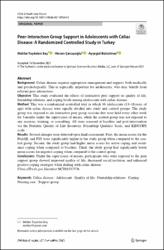| dc.contributor.author | Taşdelen Baş, Melike | |
| dc.contributor.author | Çavuşoğlu, Hicran | |
| dc.contributor.author | Bükülmez, Ayşegül | |
| dc.date.accessioned | 2022-05-23T12:02:11Z | |
| dc.date.available | 2022-05-23T12:02:11Z | |
| dc.date.issued | 27.11.2021 | en_US |
| dc.identifier.citation | Taşdelen Baş, M., Çavuşoğlu, H., & Bükülmez, A. (2021, November). Peer-Interactıon Group Support in Adolescents with Celiac Disease: A Randomized Controlled Study in Turkey. In Child & Youth Care Forum (pp. 1-20). Springer US. | en_US |
| dc.identifier.issn | 1573-3319 | |
| dc.identifier.uri | https://doi.org/10.1007/s10566-021-09664-8 | |
| dc.identifier.uri | https://hdl.handle.net/20.500.12933/1058 | |
| dc.description.abstract | Background
Celiac disease requires appropriate management and support, both medically and psychologically. This is especially important for adolescents, who may benefit from relevant peer interactions.
Objective
This study evaluated the effects of interactive peer support on quality of life, friendship relations, and coping levels among adolescents with celiac disease.
Method
This was a randomized controlled trial in which 36 adolescents (13–18 years of age) with celiac disease were equally divided into study and control groups. The study group was exposed to six interactive peer group sessions that were held every other week for 3 months under the supervision of nurses, while the control group was not exposed to any sessions, training, or consulting. All were assessed at baseline and post-intervention via the Pediatric Quality of Life Inventory, Friendship Qualities Scale, and KIDCOPE scale.
Results
Several changes were detected upon final assessment. First, the mean scores for the PedsQL and FSS were significantly higher in the study group when compared to the control group. Second, the study group had higher mean scores for active coping and avoidance coping when compared to baseline. Third, the study group had significantly lower mean scores for negative coping when compared to the control group.
Conclusions
Under the supervision of nurses, participants who were exposed to the peer support group showed improved quality of life, decreased social isolation, and enhanced positive coping strategies when dealing with celiac disease. | en_US |
| dc.language.iso | eng | en_US |
| dc.publisher | Springer | en_US |
| dc.relation.isversionof | 10.1007/s10566-021-09664-8 | en_US |
| dc.rights | info:eu-repo/semantics/embargoedAccess | en_US |
| dc.subject | Celiac disease | en_US |
| dc.subject | Adolescent | en_US |
| dc.subject | Quality of life | en_US |
| dc.subject | Friendship relations | en_US |
| dc.subject | Coping | en_US |
| dc.subject | Nursing care | en_US |
| dc.subject | Support group | en_US |
| dc.title | Peer-Interactıon Group Support in Adolescents with Celiac Disease: A Randomized Controlled Study in Turkey | en_US |
| dc.type | article | en_US |
| dc.authorid | 0000-0002-6013-5172 | en_US |
| dc.department | AFSÜ, Tıp Fakültesi, Dahili Tıp Bilimleri Bölümü, Çocuk Sağlığı ve Hastalıkları Ana Bilim Dalı | en_US |
| dc.contributor.institutionauthor | Bükülmez, Ayşegül | |
| dc.identifier.startpage | 1 | en_US |
| dc.identifier.endpage | 20 | en_US |
| dc.relation.journal | Child & Youth Care Forum | en_US |
| dc.relation.publicationcategory | Makale - Uluslararası Hakemli Dergi - Kurum Öğretim Elemanı | en_US |
















